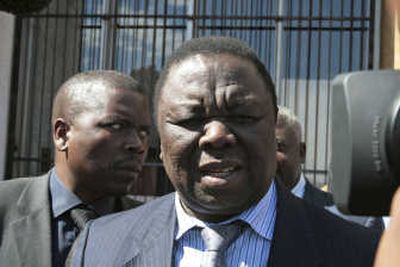Zimbabwe opposition leader seeks refuge

HARARE, Zimbabwe – Zimbabwe’s opposition leader took refuge in the Dutch Embassy after pulling out of the presidential runoff, and the U.N. Security Council condemned the government Monday for a “campaign of violence” that has prevented a fair election.
President Robert Mugabe and other top leaders pledged to press ahead with Friday’s vote, despite international criticism and the lack of a viable opposition.
In a unanimously approved statement, the 15-nation council said it “condemns the campaign of violence against the political opposition ahead of the second round of presidential elections,” resulting in the killing of scores of opposition activists and other Zimbabweans.
The U.S., France and some other Western powers tried but failed to include language asserting that Zimbabwean opposition leader Morgan Tsvangirai should be considered the legitimate president until another fair election can be held.
Council members also warned that the violence and restrictions on opposition activists imposed by the government of President Robert Mugabe “have made it impossible for a free and fair election to take place” on Friday.
Tsvangirai returned to Zimbabwe a month ago to campaign, despite warnings by his Movement for Democratic Change party that he was the target of a state-sponsored assassination plot.
Since then, his top deputy has been arrested on treason charges – which carry the death penalty – and Tsvangirai has repeatedly been detained by police. His supporters have faced such violence that the opposition leader said Sunday he could not run.
Dutch officials said Monday that Tsvangirai sought shelter in their embassy in Harare following his announcement Sunday that he was withdrawing from the runoff but said he did not ask for political asylum.
Tsvangirai “asked if the Dutch Embassy could provide him with refuge because he was feeling unsafe,” Foreign Minister Maxime Verhagen told the British Broadcasting Corp.
At a news conference in Harare late Monday, Zimbabwe’s police commissioner, Augustin Chihuri, said neither Tsvangirai nor his party had reported any threats, and police were not seeking the politician.
Condemnation of Mugabe poured in from the U.S., Europe and elsewhere.
“In forsaking the most basic tenet of governance, the protection of its people, the government of Zimbabwe must be held accountable by the international community,” Secretary of State Condoleezza Rice said in a statement.
“Clearly, a government that emerges out of elections in which the opposition can’t even participate could not be considered free and fair or legitimate,” she said.
Tsvangirai won the first round of the presidential election on March 29, but did not gain an outright majority against Mugabe. That campaign was generally peaceful, but the runoff has been overshadowed by violence and intimidation.
Independent human rights groups say 85 people have died and tens of thousands have been displaced from their homes, most of them opposition supporters.